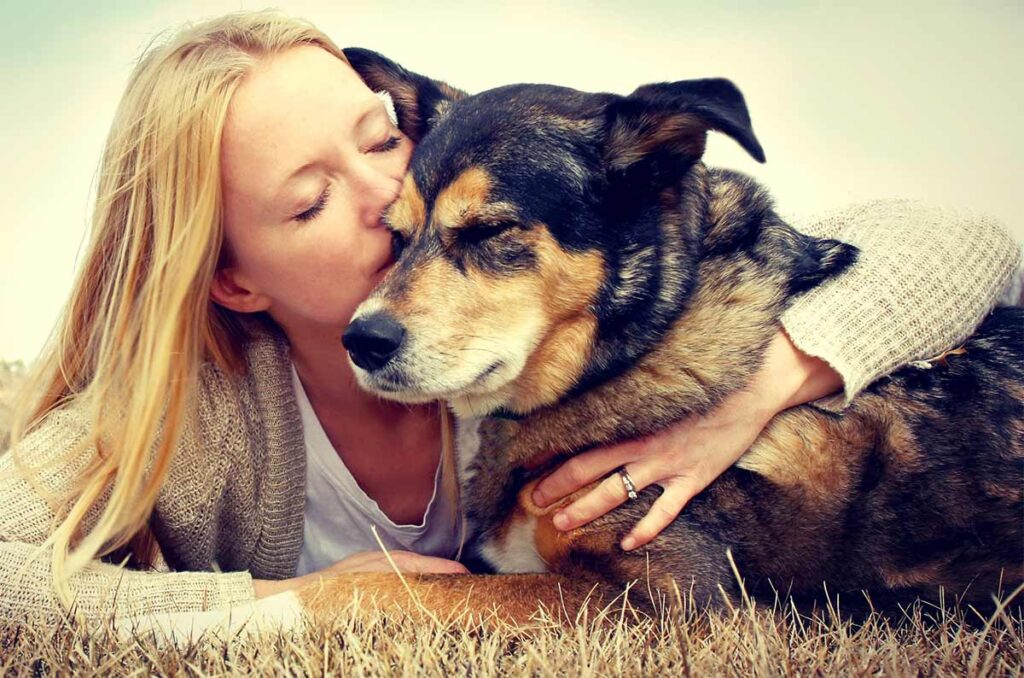
This article was updated on December 5th, 2022
“Jack has started to have bowel movements in the house,” she told me. When I asked my client more about what she was seeing, she reported to me that her dog Jack had been more anxious the last several months and seemed to act like he was lost when he went outside. As she explained his behavior to me, she indicated that she just thinks that Jack was getting older. In fact, if Jack wasn’t at the office for his routine bi-annual exam, she probably would not have even mentioned it.
Sadly, this is the case for many of my patients. As our pets age, many of us expect them to slow down, develop arthritis, and stop moving around as much. Some of us may even expect that certain organs, such as the kidneys and liver, may not function in their optimal state. What about the brain, though? Unfortunately, brain health is something that is widely forgotten in our pets… until recently, that is.
As veterinary medicine has progressed, our pets are now living much longer and healthier lives. We can now recognize that brain health plays an important role in the quality of life for our geriatric pets. This is important to recognize for dementia or “canine cognitive dysfunction.” Jack’s mom, like many of my other clients, truly believed Jack was just getting older and didn’t realize that his brain health was actually in question.
How will dementia affect my dog’s life?

Dementia, commonly referred to as “canine cognitive dysfunction,” can present differently in every dog. There are four different categories we look at to determine possible cognitive dysfunction: sleep-wake cycle, social interactions, house training, and disorientation levels. Looking at these categories, we have been to determine stages of dementia in order to help classify symptoms for which our pet owners can monitor.
- Mild Dementia (Stage 1)
- Decreased sleeping at night and increased sleeping during the day
- Decreased interaction with family members
- Moderate Dementia (Stage 2)
- Hyperactivity or pacing at night, but calming down when owners come sit with their pet
- Urinating or defecating in the house or loss of house training
- Pets no longer get up to greet family members when they come home
- Preference to spend time alone rather than with family members
- Increased anxiety levels or mild aggression
- Severe Dementia (Stage 3)
- Pacing and unable to get settled or be comfortable
- Circling and getting lost in corners or along walls
- Frequently gets lost when outside in the yard
- Barking through the night even with owners coming into sit with the pet
- Pets no longer recognize family members or are non-responsive to them
- Frequent house soiling
Does Life Expectancy Vary by Dementia Stage?
Dementia stage does not appear to directly play a role in the life expectancy of our pets. Rather, life expectancy is more related to IF a diagnosis of canine dementia has been made. Sadly, many pets are euthanized before the diagnosis of dementia is even made because owners just assume the pet is getting older and that nothing can be done. This was the case with Jack that was noted above. That is, until I was able to talk to Jack’s owner further about dementia.
Treatment may allow pets to live to their their full lifespan once the diagnosis of dementia is made as long as owners and veterinarians work together as a team. Symptoms of canine dementia will usually improve within thirty to ninety days of treatment implementation in both mild and severe stages of dementia. However, as patients with severe dementia are often elderly, there is frequently other diseases for which the patients are being treated. This may make it appear that more severe stages of canine dementia have worse life expectancy. This is simply not the case, though. In many cases of treated dementia, the decision for humane euthanasia often comes as a result of the progression of other health conditions (i.e arthritis, diabetes mellitus, separation anxiety) rather than the dementia itself.
It is important to recognize that this is only the case for pets whom’s owners pursue treatment. Prognosis for dogs who are not treated for their dementia does appear to be poor due to poor quality of life. Many of these pets do get humanely euthanized due to their symptoms.
Can my dog still live a happy life with dementia, even without treatment?
The treatments can be extensive, not to mention expensive, especially if you must treat other health conditions alongside the dementia. Behavior modification without medications, supplements, or diet change will help decrease the rate of neurons’ loss in the brain. However, it will not stop the inflammation in the brain caused by abnormal protein deposits or free radicals seen. Without treatment, canine dementia will progress to where quality of life may be a concern.
Our pets are such a special part of our life, but we are often their whole life. In the early stages of dementia, pets can still live happy lives. As dementia progresses, pets lose the desire to interact with their owners. In severe stages, pets often don’t even recognize their owner. At that point, they have lost their entire world. Quality of life must be assessed at that point.
Will dementia treatments extend my dog’s life?

As with most diseases, prevention or early identification of dementia is key. The sooner dementia can be identified, the higher likelihood that treatments can slow progression of the disease, thus extending the quality of life for our pets (Source). In the early stages, we can start adding those nutritional supplements or changing foods to a diet that helps promote brain health to slow the progression of dementia. As dementia continues to progress, adding in medications such as selegiline will also help.
Unfortunately, early identification of dementia in our pets is rare. One study reported that less than 12% of clients report cognitive changes to their veterinarian even though 57% of clients noted they had seen behavior changes in their babies. Because of this, most cases of dementia are not diagnosed until they are in the severe stage. Once the decline has started, progression will follow.
Studies show that progression of mild stage to severe stages can occur over a six months to two-year time period. However, the study also showed that a diagnosis of canine dementia does not appear to affect survival despite stage: rather, most pets were put to sleep due to other coexisting health conditions. Treatment of canine dementia can be effective, and these pets can live a good quality of life if treatment is pursued.
How will my vet treat dementia?

As other health conditions are often present along with dementia, it is of the utmost importance that we treat all the conditions in a pet. Should pain be present, NSAIDs (Non-steroidal anti-inflammatory drugs) may often be used. Should anxiety be present, trazadone or gabapentin may be used. If there is inappetence (lack of appetite) or nausea present, your veterinarian may prescribe anti-emetics such as maropitant or ondansetron. It is vital that the symptoms to the other conditions be controlled in order for dementia treatments to be most effective.
As other health conditions are often present along with dementia, it is of the utmost importance that we treat all the conditions in a pet. Should pain be present, NSAIDs (Non-steroidal anti-inflammatory drugs) may often be used. Should anxiety be present, trazadone or gabapentin may be used. If there is inappetence (lack of appetite) or nausea present, your veterinarian may prescribe anti-emetics such as maropitant or ondansetron. It is vital that the symptoms to the other conditions be controlled in order for dementia treatments to be most effective.
Since we know there is not a cure for dementia, treatments goals for dementia patients are aimed at slowing the progression of dementia and improving current clinical symptoms. This is best accomplished by using a combination of drugs, food, nutritional supplements, and behavior training. Let’s dive in a bit more!
- Drugs: Anipryl (Selegiline) is the only FDA approved medication for us in canine dementia. It is a monoamine oxidase inhibitor, which works in the brain to alter norepinephrine, dopamine, and serotonin levels, all important neuro-messengers. It also decreases production of free radicals and increases clearance of the free radicals that are produced. This allows for restored sleep-wake cycles. Downsides of this medication is that it’s difficult to use with other drugs due to its broad range of interactions.
- Nutritional diets: Hill’s B/D, Purina Neurocare, Royal Canin Veterinary Mature Consult are all high-quality diets designed to promote brain health. In fact, pets who ate a high quality commercial diet designed for age, size, and health status were 2.8x less likely to develop canine dementia compared to those pets who ate an inferior quality commercial diet or table food (Source). Depending on the specific pet’s overall health condition, these diets can have different benefits.
- Hill’s B/D and Royal Canin Mature Consult: Great for use as a senior diet. Studies show that these diets are full of antioxidants and vitamins that have been shown to improve age related behavior changes and learning ability in older dogs by limiting cellular damage in the brain. Improved cognitive function can be seen in as little as 30 days.

- Purina Neurocare: Originally designed as an adjunctive treatment for idiopathic epilepsy, studies have shown that this diet can improve the symptoms of canine dementia within 2-3 months. This diet is full of fatty acid that helps to decrease brain inflammation and to enhance clearance of free radicals that cause brain damage and neuron loss. This diet would be ideal for pets who have a history of seizures or are currently having seizures along with their dementia.
- Nutritional supplements: These are great because they have a low incident of side effects, and they can be started and stopped without weaning schedules. There are many brain health supplements on the market, but by far, some of the most effective are listed below.
- SAME: Free radical scavenger and liver protectant.
- SeniLife: protects neurons and increases brain metabolic function. It also has been shown to increase blood flow and glucose consumption, allowing for optimal brain function. Improvement in cognitive function can be expected to be seen within 7 days.
- Medium-chain triglycerides (MCT): these specific fatty acids are converted in the brain to ketones, which can be used as an alternative source of energy. In a study comparing 6-year-old dogs to 1-year-old dogs, 1-year-olds were found to have increased brain glucose metabolism. Adding in MCTs to the 6-year-old dogs diets increased their glucose consumption, indicating increased cognitive function.
- Other noteworthy nutritional supplements are L-arginine and Neutricks Cognitive Support, both of which help to slow the aging process and have anti-inflammatory effects.
- Behavior modification and environmental enrichment are one of the key components of treatment that focuses on maintaining neurons. Often with dementia, we will see a decrease in neurons, which are the functioning units in the brain. Conserving these neurons by increasing mental stimulation and instituting predictable routines is an important need for our geriatric pets. Examples of this may include.
- Taking your pet for small frequent walks throughout the day instead of one long walk at the end or beginning of the day.
- If mobility is a problem, consider adding in scent work with your pet. Examples of this would be to hide treats around the room and have your pet look for them.
- Play hide and seek with your pet so they have to look for you.
- Food and activity puzzles work help to slow eating and to increase mental stimulation as pets have to work to get the food out of the puzzle.
- Positive reinforcement works to help retrain behaviors as they are lost or to establish a new routine for your pet.
- Retrain older dogs who have difficulty going outside to eliminate in a litter box or on potty pads. This is especially helpful for those dogs who will go outside on a walk and then come inside and immediately go to the bathroom.
- Retraining children and guests of how to approach pets who have dementia will help to reduce aggressive incidences. Creating verbal cues that go along with a hand signal or light signal will help train pets who have auditory, visual, or mobility issue that they are going to be touched so that they are not fearful.
How can I make my dog’s life better with dementia?
You are your pet’s advocate! If you notice anything different in your pet, the best thing is to schedule a consult with your veterinarian. As veterinarians, we rely heavily on what you all see at home and how you interact with your babies. We cannot take care of your babies without you. We are on your team!
If you notice a change in your pet’s behavior or daily functions, don’t assume your pet is just getting older. Remember, age is not a disease, but we can develop diseases as we get older. If you’re not sure if a behavior you are seeing is abnormal, start a journal of how often you are noticing the behavior. Also, take videos for your veterinarian to assess. Being able to see what you see is imperative in the proper diagnosis of your baby’s health condition.

And when your baby is diagnosed with dementia, don’t freak out. Remember that with treatments, your baby can live a good quality of life – even with dementia!
FAQ about dog dementia
Is there a cure for dementia?
Is there a cure for dementia?
Dementia is not curable, but it can be managed with different treatments. To fully understand why these treatments are effective requires us to understand what changes are seen in the brain with dementia. Studies have shown that dogs with dementia have similar changes to people with Alzheimer’s disease.
General physiologic changes we see include:
- Decreases in the activity of neuro-messengers involved in the cholinergic system, which is a major player in controlling acetylcholine levels used by the parasympathetic system, helping us to relax.
- Increases in the activity of the neuro-messengers involved in the adrenergic system, which is the system responsible for our fight-or-flight response. This is the same system activated by long-term stress and can cause malfunction of other organ systems such as our heart, liver, and gastrointestinal tract with continued activation.
- Higher levels of monoamine oxidase, which is one of enzymes that the brain uses to remove neuro-messengers such as norepinephrine, serotonin, and dopamine.
- Decreased numbers of neurons, which are the working cells of the brain and allow for cognitive function.
- Increases in free radical production and decreased ability of the brain to clear these free radicals. Free radicals cause increased inflammation in the brain and other organs systems.
Armed with this knowledge, we can now understand that treatments will be targeted at reversing or stopping the physiologic changes. Goals of treatment will involve:
- Balancing the cholinergic system and the adrenergic system, as both are important for optimal brain health
- Inhibiting monoamine oxidase levels, allowing for neuro-messengers to be at effective levels
- Conserving the highest number of neurons possible
- Decreasing free radical production and clearing free radicals from the brain and body
How will my vet know if my dog has dementia?
Dementia can be a tricky diagnosis due to the variety of symptoms pets can develop. Furthermore, many of these symptoms overlap with other diseases and health conditions. Dementia is what we call a “diagnosis of exclusion,” meaning that your veterinarian will run tests to look for other diseases such as arthritis, diabetes mellitus, Cushing’s disease, liver and kidneys dysfunction, seizures disorders, cancer, or even simply deficits in your pet’s hearing or vision. Tests such as bloodwork, urinalysis, x-rays, and even ultrasound may need to be completed to fully assess the situation.
Common questions your veterinarian may ask you about your pet will deal with:
- House training
- Loss of obedience
- Increased anxieties
- New fears or phobias
- Changes in personality or aggression
Once medical tests are done to fully complete your pet’s condition, the diagnosis will be made based on behavior and whether that behavior may be related to the other conditions present or not.
Do Dogs with Dementia Suffer?
Dog with dementia can live a great quality of life when properly treated. Even in severe stages of dementia, we can see improvement in dementia symptoms in as little as thirty to ninety days. It is important to remember that as the body changes, lifestyle may need to change. A change in lifestyle does not mean our pets are suffering, though.
As veterinarians, we encourage our owners to consider these questions to determine if pets are suffering.
- Is my pet able to move around around comfortably?
- Is my pet still as excited to eat and drink as they have been in the past?
- Is my pet still interacting with me, my family, and my other pets like they have in the past?
If the answer to one of those questions is “no” at any point, then your pet needs to be seen by your veterinarian. They will help to determine if there is a medical cause for your pet to have a change and to determine how to best treat that medical cause. If a medical cause cannot be found or a medial condition is deemed to be terminal, then quality of life must be considered at that point.
Should I Put My Dog with Dementia Down?
A diagnosis of dementia does not mean you need to put your dog to sleep. Dogs with dementia simply need to have treatment interventions – in many cases, simply changing the diet and working to improve environmental enrichment can improve the quality of life for your dog. When that is not enough, medications can help as well.
It is important to look at the overall quality of life for your pet. An honest conversation with your veterinarian about all the health conditions your dog is dealing with is required to make the best decision about when it is time to put your dog to sleep. Rest easy in knowing that many dogs who have their dementia treated can potentially live up to two more years – that’s two more years of snuggles, sloppy wet face kisses, and sweet memories. Canine dementia is not a terminal disease.
Disclaimer: This website's content is not a substitute for veterinary care. Always consult with your veterinarian for healthcare decisions. Read More.

Be the first to comment